homepage news
Top 10 national news stories of 2020
A pandemic, depression, racial reckoning — and a presidential election, too
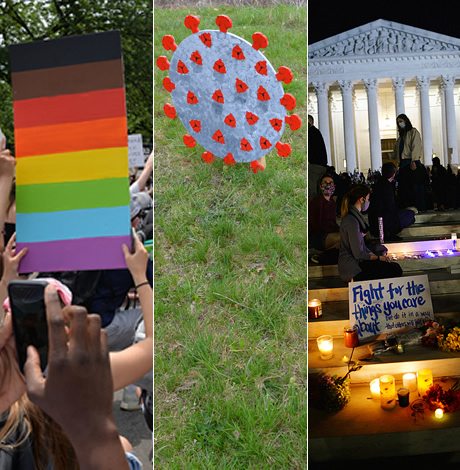
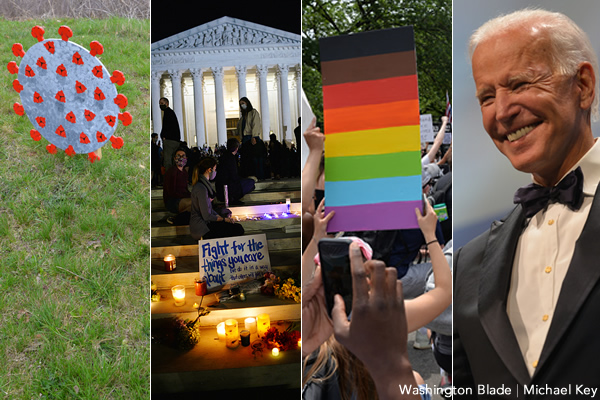
Newsrooms around the world were stretched to the limit in 2020, as journalists, including those at the Blade, struggled to cover multiple once-in-a-lifetime crises at once: a pandemic, the worst financial crisis since the Great Depression, a reckoning over racial justice and police brutality, and the 2020 presidential election.
Here are the Blade staff picks for the top 10 national news stories of 2020.
10: Methodist Church faces split
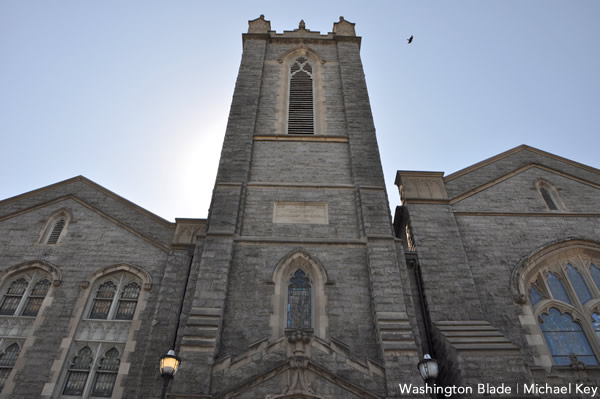
Amid division in the denomination over LGBTQ clergy and same-sex marriage, the Methodist Church proposed a formal plan this year to separate on the lack of agreement on religious views toward LGBTQ people.
The Methodist Church agreed to adopt a more LGBTQ-inclusive doctrine while allowing a coalition of conservative congregations in the United States and Africa who objected to change to separate. The “Protocol of Reconciliation and Grace through Separation” would allow the departing congregations to keep their property and give them $25 million to form a new denomination.
The plan would have needed approval in May 2020 in General Conference for ratification. The vote, however, never took place and was postponed until 2021 during the coronavirus pandemic.
9: Trump campaign stages Pride events
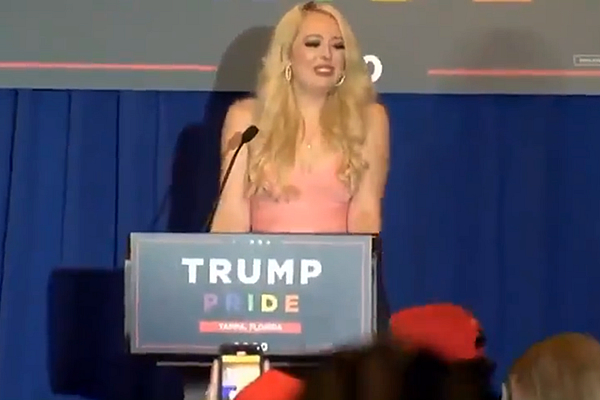
Upon stepping down from the Trump administration, Richard Grenell took on a new role as senior adviser for the Trump campaign on LGBTQ outreach and was made co-chair of the Trump Pride coalition, marking the first time a Republican presidential nominee had an LGBTQ political coalition.
Trump Pride held events in states deemed competitive in the election, including Arizona, Michigan, Pennsylvania, and Florida. Tiffany Trump, who had heretofore kept a low profile during her dad’s administration, participated in Trump Pride events in full support of her father, although she was mocked on Twitter during her public appearances.
Arguably, the Trump Pride coalition found success in convincing some LGBTQ voters to come to their side. Exit polls revealed 61 percent of LGBTQ voters backed Biden, the lowest percentage of support ever for a Democratic nominee, while 28 percent backed Trump, doubling his LGBTQ support from 2016.
8: Ric Grenell named acting DNI, 1st out gay Cabinet official
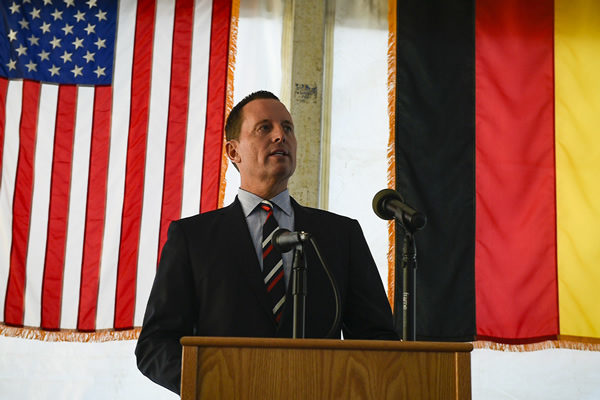
A Republican administration made the historic first of appointing the first openly gay person to a Cabinet post when President Trump named Richard Grenell, who had been serving as U.S. ambassador to Germany, as acting director of national intelligence.
Critics pointed out Trump never sought or won Senate confirmation for the role. Grenell also used the position as a political tool to declassify documents, seeking to impugn Biden for unmasking individuals caught up in surveillance during the Michael Flynn investigation.
But Grenell also used the position to highlight the global initiative to decriminalize homosexuality he spearheaded, threatening to cut off U.S. partners overseas from shared intelligence if they didn’t respect LGBTQ human rights.
Upon his departure, Grenell posted a photo to Instagram asserting President Trump gave him his Cabinet chair because being the first openly gay person to serve at that level was a “big deal.”
7: LGBTQ candidates win big on election night
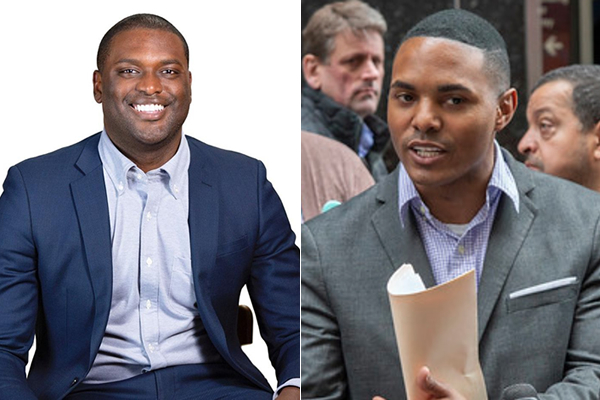
LGBTQ candidates in the 2020 election achieved historic firsts, breaking barriers and demonstrating political aspirants in marginalized communities have no limit in winning public office.
The LGBTQ Equality Caucus in the U.S. House will be expanded and diversified with the addition of Ritchie Torres and Mondaire Jones of New York, who will be the first Black, openly gay men elected to Congress. Torres is also the first openly gay Afro-Latino elected to Congress.
Sarah McBride, a transgender advocate famous for her speech at the Democratic National Convention in 2016, was elected to a seat in the Delaware State Senate, setting her up to become the highest-ranking openly transgender legislator in the United States. Other transgender candidates, Taylor Small in Vermont and Stephanie Byer in Kansas, won seats in state legislatures, nearly doubling the number of transgender legislators in the United States.
6: FDA eases gay blood ban
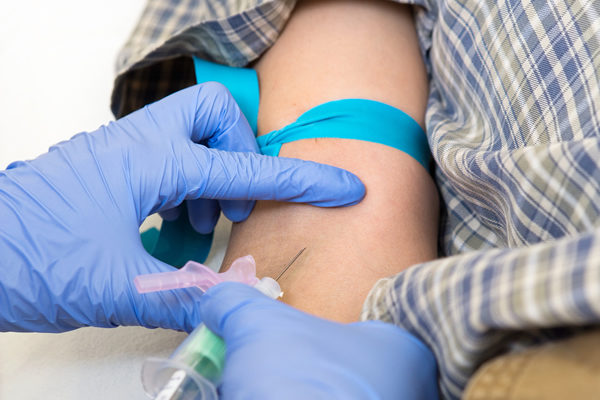
In a move uncharacteristically positive for the LGBTQ community from the Trump administration, the Food & Drug Administration this year eased the ban on blood donations from gay and bisexual men.
The previous policy, set up by the Obama administration, required men to abstain from having sex with men for 12 months before making a donation. The FDA, amid a blood shortage during the coronavirus pandemic, shortened the deferral period to three months. The 12-month wait instituted during the Obama administration was a drastic change from the lifetime ban on blood donations from gay and bisexual men instituted in 1983.
President Trump said he had no hand in the FDA decision. When asked by the Blade about the change during a White House news conference, Trump replied, “No. I didn’t know anything about that. That was done by the FDA, very capable people at the FDA.”
5: RBG dies weeks before election
Ruth Bader Ginsburg, known as a champion of LGBTQ rights as an associate justice on the U.S. Supreme Court, died after 27 years on the bench. Hundreds gathered at the Supreme Court on the night of her death to adorn the ground with memorabilia in mourning over her passing.
Ginsburg had joined each of the milestone rulings in favor of LGBTQ rights and same-sex marriage, including Romer v. Evans, Lawrence v. Texas, Windsor v. United States and Obergefell v. Hodges. Most recently, Ginsburg joined the Bostock decision finding anti-LGBTQ discrimination is illegal under federal civil rights law.
President Trump, however, chose to fill Ginsburg’s seat with Amy Coney Barrett, a jurist who’s a favorite among the Christian right. Shortly after confirmation, Barrett participated in arguments for the case of Fulton v. City of Philadelphia, which will determine whether a Catholic foster care agency has a First Amendment right to reject LGBTQ families over religious objections.
4: Landmark SCOTUS ruling on LGBTQ workplace rights
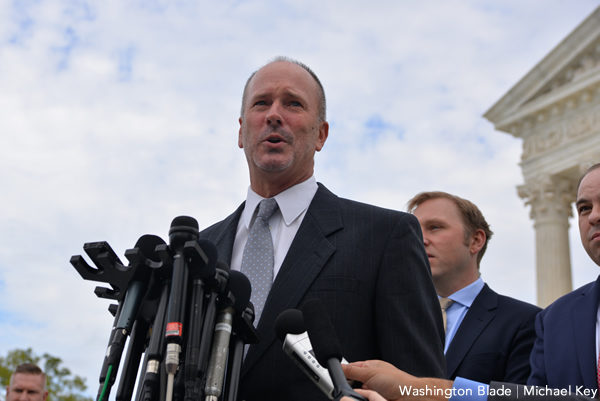
In a historic ruling ending a long fight to prohibit employment discrimination against LGBTQ people in federal law, the U.S. Supreme Court ruled in the consolidated case of Bostock v. Clayton County that anti-LGBTQ discrimination constitutes a form of sex discrimination.
Although the ruling pertained to employment discrimination under Title VII of the Civil Rights Act of 1964, the decision has broad applications to all laws banning sex discrimination, including civil rights law in housing, health care, education, and credit.
The litigation came about after Gerald Bostock was fired from his job as a municipal worker after expressing interest in a gay softball league and Aimee Stephens, a funeral home director in Michigan, who was fired for being transgender. Stephens died shortly before the decision was handed down.
The Trump administration, however, never fully implemented the decision, and outright flouted it with regard to access to sex-segregated spaces for transgender people. Biden is expected to recognize Bostock fully upon taking office.
3: Calls for racial justice after George Floyd killed
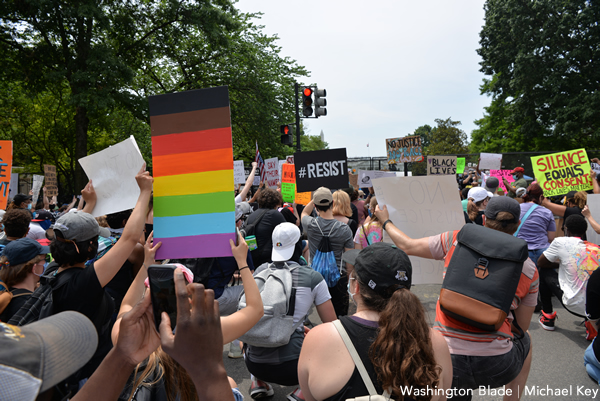
The death of George Floyd at the hands of Minneapolis police ignited a firestorm of protests and energized the Black Lives Matter movement, bringing calls for police reform, if not to outright defund the police, and end systemic racism.
LGBTQ Pride events, which had been cancelled amid the coronavirus epidemic, were in some cases back on with a renewed focus on anti-racism. (Drama followed, however, when LA Pride planned a solidarity march and sought cooperation with police. Organizers ended up handing over the reins to All Black Lives Matter, an advisory board of Black LGBTQ activists.)
Much of the outrage was directed at President Trump, who reportedly hid in a bunker amid protests that became violent outside the White House. Afterwards, Trump went to St. John’s Church near Lafayette Square with Cabinet officials to hold up a Bible in a controversial photo-op.
2: Biden wins; Kamala Harris makes history
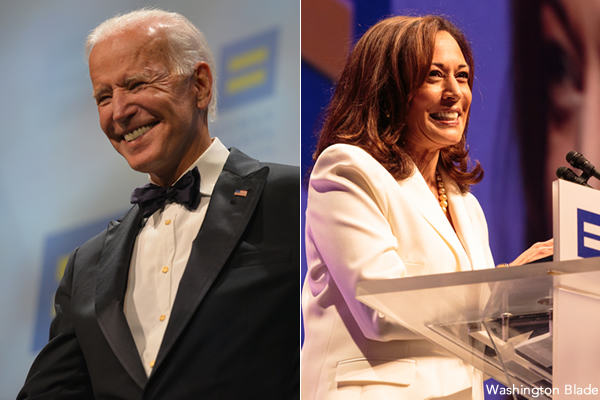
Joe Biden won the presidential election this year, ensuring Donald Trump would be a one-term president and bringing an end to an administration with a record of anti-LGBTQ policies.
Biden, whose comments in favor of same-sex marriage on “Meet the Press” in 2012 are still remembered for their impact, has long-standing connections to the LGBTQ community and issued a detailed policy plan for LGBTQ initiatives he’d pursue in his administration. Biden has pledged to end the transgender military ban and sign the Equality Act into law within 100 days.
Vice President-elect Kamala Harris, who made history as the first woman of color elected as part of a presidential ticket, also has deep ties to the LGBTQ community. As California attorney general, Harris declined to defend California’s ban on same-sex marriage on Proposition 8 in court and raised LGBTQ issues as U.S. senator.
In another historic move, Biden tapped Pete Buttigieg for Transportation Secretary. He would become the first openly gay Senate-confirmed Cabinet official if approved in 2021.
1: Coronavirus ravages U.S. public health, economy
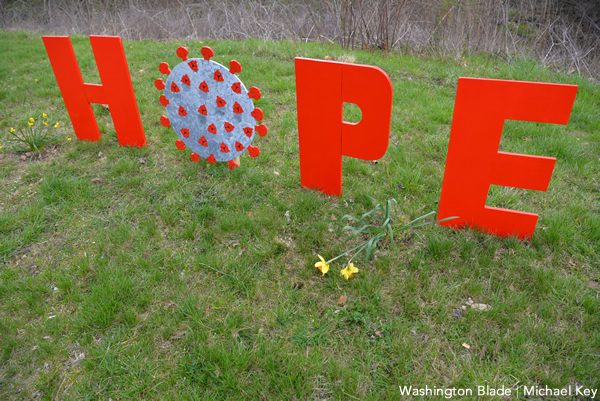
The coronavirus pandemic left hundreds of thousands dead, disrupted lives and threw the economy into a tailspin, stoking fears in a way no other public health crisis has done since the HIV/AIDS epidemic as the virus continued to spread. The outbreak is the Washington Blade’s top national news event of 2020.
COVID-19, which originated in China, had killed by mid-December an estimated 300,000 people in the United States and infected 16 million. Although states kept tabs on racial, ethnic, and gender demographics on the disease, few recorded data on LGBTQ casualties.
An estimated 100,000 businesses across the nation closed their doors as governors ordered residents to remain at home, much to the consternation of conservative activists who said the directives were unconstitutional. The annual Pride month celebrations and parades were among the events cancelled.
The downturn in the economy forced many small business to close and put many workers on unemployment. Hospitality workers, many of whom are LGBTQ people, were hit especially hard. The Paycheck Protection Program saved many jobs, but as of late December, Congress had not come to an agreement on additional stimulus.
President Trump, who continued to insist the coronavirus would simply “go away,” faced heavy criticism for failing to contain the epidemic, leading to major change in the 2020 election.
Honorable mention: Blade reporter refuses to move seat in WH briefing room
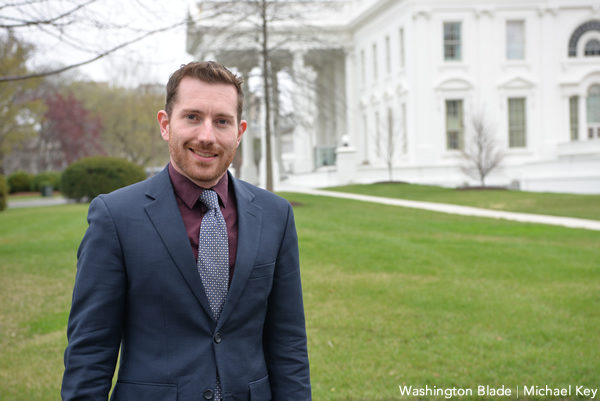
When Blade reporter Chris Johnson was fulfilling his role in the pool rotation for the White House press corps, the White House press office sought to humiliate CNN’s Kaitlan Collins by ordering Johnson to switch seats with her. Collins had an assigned seat in the front row of the briefing room, while the seating arrangements had the Blade toward the back.
Johnson refused to move, pointing out the White House Correspondents Association controls the seating assignments, not the White House. Johnson held firm even though he was told the Secret Service was involved in wanting the switch. Secret Service later denied any involvement. Johnson won widespread praise from mainstream media colleagues for his cool-headed, brave handling of the situation. (By Kevin Naff)
homepage news
Honoring the legacy of New Orleans’ 1973 UpStairs Lounge fire
Why the arson attack that killed 32 gay men still resonates 50 years later

On June 23 of last year, I held the microphone as a gay man in the New Orleans City Council Chamber and related a lost piece of queer history to the seven council members. I told this story to disabuse all New Orleanians of the notion that silence and accommodation, in the face of institutional and official failures, are a path to healing.
The story I related to them began on a typical Sunday night at a second-story bar on the fringe of New Orleans’ French Quarter in 1973, where working-class men would gather around a white baby grand piano and belt out the lyrics to a song that was the anthem of their hidden community, “United We Stand” by the Brotherhood of Man.
“United we stand,” the men would sing together, “divided we fall” — the words epitomizing the ethos of their beloved UpStairs Lounge bar, an egalitarian free space that served as a forerunner to today’s queer safe havens.
Around that piano in the 1970s Deep South, gays and lesbians, white and Black queens, Christians and non-Christians, and even early gender minorities could cast aside the racism, sexism, and homophobia of the times to find acceptance and companionship for a moment.
For regulars, the UpStairs Lounge was a miracle, a small pocket of acceptance in a broader world where their very identities were illegal.
On the Sunday night of June 24, 1973, their voices were silenced in a murderous act of arson that claimed 32 lives and still stands as the deadliest fire in New Orleans history — and the worst mass killing of gays in 20th century America.
As 13 fire companies struggled to douse the inferno, police refused to question the chief suspect, even though gay witnesses identified and brought the soot-covered man to officers idly standing by. This suspect, an internally conflicted gay-for-pay sex worker named Rodger Dale Nunez, had been ejected from the UpStairs Lounge screaming the word “burn” minutes before, but New Orleans police rebuffed the testimony of fire survivors on the street and allowed Nunez to disappear.
As the fire raged, police denigrated the deceased to reporters on the street: “Some thieves hung out there, and you know this was a queer bar.”
For days afterward, the carnage met with official silence. With no local gay political leaders willing to step forward, national Gay Liberation-era figures like Rev. Troy Perry of the Metropolitan Community Church flew in to “help our bereaved brothers and sisters” — and shatter officialdom’s code of silence.
Perry broke local taboos by holding a press conference as an openly gay man. “It’s high time that you people, in New Orleans, Louisiana, got the message and joined the rest of the Union,” Perry said.
Two days later, on June 26, 1973, as families hesitated to step forward to identify their kin in the morgue, UpStairs Lounge owner Phil Esteve stood in his badly charred bar, the air still foul with death. He rebuffed attempts by Perry to turn the fire into a call for visibility and progress for homosexuals.
“This fire had very little to do with the gay movement or with anything gay,” Esteve told a reporter from The Philadelphia Inquirer. “I do not want my bar or this tragedy to be used to further any of their causes.”
Conspicuously, no photos of Esteve appeared in coverage of the UpStairs Lounge fire or its aftermath — and the bar owner also remained silent as he witnessed police looting the ashes of his business.
“Phil said the cash register, juke box, cigarette machine and some wallets had money removed,” recounted Esteve’s friend Bob McAnear, a former U.S. Customs officer. “Phil wouldn’t report it because, if he did, police would never allow him to operate a bar in New Orleans again.”
The next day, gay bar owners, incensed at declining gay bar traffic amid an atmosphere of anxiety, confronted Perry at a clandestine meeting. “How dare you hold your damn news conferences!” one business owner shouted.
Ignoring calls for gay self-censorship, Perry held a 250-person memorial for the fire victims the following Sunday, July 1, culminating in mourners defiantly marching out the front door of a French Quarter church into waiting news cameras. “Reverend Troy Perry awoke several sleeping giants, me being one of them,” recalled Charlene Schneider, a lesbian activist who walked out of that front door with Perry.

Esteve doubted the UpStairs Lounge story’s capacity to rouse gay political fervor. As the coroner buried four of his former patrons anonymously on the edge of town, Esteve quietly collected at least $25,000 in fire insurance proceeds. Less than a year later, he used the money to open another gay bar called the Post Office, where patrons of the UpStairs Lounge — some with visible burn scars — gathered but were discouraged from singing “United We Stand.”
New Orleans cops neglected to question the chief arson suspect and closed the investigation without answers in late August 1973. Gay elites in the city’s power structure began gaslighting the mourners who marched with Perry into the news cameras, casting suspicion on their memories and re-characterizing their moment of liberation as a stunt.
When a local gay journalist asked in April 1977, “Where are the gay activists in New Orleans?,” Esteve responded that there were none, because none were needed. “We don’t feel we’re discriminated against,” Esteve said. “New Orleans gays are different from gays anywhere else… Perhaps there is some correlation between the amount of gay activism in other cities and the degree of police harassment.”

An attitude of nihilism and disavowal descended upon the memory of the UpStairs Lounge victims, goaded by Esteve and fellow gay entrepreneurs who earned their keep via gay patrons drowning their sorrows each night instead of protesting the injustices that kept them drinking.
Into the 1980s, the story of the UpStairs Lounge all but vanished from conversation — with the exception of a few sanctuaries for gay political debate such as the local lesbian bar Charlene’s, run by the activist Charlene Schneider.
By 1988, the 15th anniversary of the fire, the UpStairs Lounge narrative comprised little more than a call for better fire codes and indoor sprinklers. UpStairs Lounge survivor Stewart Butler summed it up: “A tragedy that, as far as I know, no good came of.”
Finally, in 1991, at Stewart Butler and Charlene Schneider’s nudging, the UpStairs Lounge story became aligned with the crusade of liberated gays and lesbians seeking equal rights in Louisiana. The halls of power responded with intermittent progress. The New Orleans City Council, horrified by the story but not yet ready to take its look in the mirror, enacted an anti-discrimination ordinance protecting gays and lesbians in housing, employment, and public accommodations that Dec. 12 — more than 18 years after the fire.
“I believe the fire was the catalyst for the anger to bring us all to the table,” Schneider told The Times-Picayune, a tacit rebuke to Esteve’s strategy of silent accommodation. Even Esteve seemed to change his stance with time, granting a full interview with the first UpStairs Lounge scholar Johnny Townsend sometime around 1989.
Most of the figures in this historic tale are now deceased. What’s left is an enduring story that refused to go gently. The story now echoes around the world — a musical about the UpStairs Lounge fire recently played in Tokyo, translating the gay underworld of the 1973 French Quarter for Japanese audiences.
When I finished my presentation to the City Council last June, I looked up to see the seven council members in tears. Unanimously, they approved a resolution acknowledging the historic failures of city leaders in the wake of the UpStairs Lounge fire.
Council members personally apologized to UpStairs Lounge families and survivors seated in the chamber in a symbolic act that, though it could not bring back those who died, still mattered greatly to those whose pain had been denied, leaving them to grieve alone. At long last, official silence and indifference gave way to heartfelt words of healing.
The way Americans remember the past is an active, ongoing process. Our collective memory is malleable, but it matters because it speaks volumes about our maturity as a people, how we acknowledge the past’s influence in our lives, and how it shapes the examples we set for our youth. Do we grapple with difficult truths, or do we duck accountability by defaulting to nostalgia and bluster? Or worse, do we simply ignore the past until it fades into a black hole of ignorance and indifference?
I believe that a factual retelling of the UpStairs Lounge tragedy — and how, 50 years onward, it became known internationally — resonates beyond our current divides. It reminds queer and non-queer Americans that ignoring the past holds back the present, and that silence is no cure for what ails a participatory nation.
Silence isolates. Silence gaslights and shrouds. It preserves the power structures that scapegoat the disempowered.
Solidarity, on the other hand, unites. Solidarity illuminates a path forward together. Above all, solidarity transforms the downtrodden into a resounding chorus of citizens — in the spirit of voices who once gathered ‘round a white baby grand piano and sang, joyfully and loudly, “United We Stand.”

Robert W. Fieseler is a New Orleans-based journalist and the author of “Tinderbox: the Untold Story of the Up Stairs Lounge Fire and the Rise of Gay Liberation.”
homepage news
New Supreme Court term includes critical LGBTQ case with ‘terrifying’ consequences
Business owner seeks to decline services for same-sex weddings

The U.S. Supreme Court, after a decision overturning Roe v. Wade that still leaves many reeling, is starting a new term with justices slated to revisit the issue of LGBTQ rights.
In 303 Creative v. Elenis, the court will return to the issue of whether or not providers of custom-made goods can refuse service to LGBTQ customers on First Amendment grounds. In this case, the business owner is Lorie Smith, a website designer in Colorado who wants to opt out of providing her graphic design services for same-sex weddings despite the civil rights law in her state.
Jennifer Pizer, acting chief legal officer of Lambda Legal, said in an interview with the Blade, “it’s not too much to say an immeasurably huge amount is at stake” for LGBTQ people depending on the outcome of the case.
“This contrived idea that making custom goods, or offering a custom service, somehow tacitly conveys an endorsement of the person — if that were to be accepted, that would be a profound change in the law,” Pizer said. “And the stakes are very high because there are no practical, obvious, principled ways to limit that kind of an exception, and if the law isn’t clear in this regard, then the people who are at risk of experiencing discrimination have no security, no effective protection by having a non-discrimination laws, because at any moment, as one makes their way through the commercial marketplace, you don’t know whether a particular business person is going to refuse to serve you.”
The upcoming arguments and decision in the 303 Creative case mark a return to LGBTQ rights for the Supreme Court, which had no lawsuit to directly address the issue in its previous term, although many argued the Dobbs decision put LGBTQ rights in peril and threatened access to abortion for LGBTQ people.
And yet, the 303 Creative case is similar to other cases the Supreme Court has previously heard on the providers of services seeking the right to deny services based on First Amendment grounds, such as Masterpiece Cakeshop and Fulton v. City of Philadelphia. In both of those cases, however, the court issued narrow rulings on the facts of litigation, declining to issue sweeping rulings either upholding non-discrimination principles or First Amendment exemptions.
Pizer, who signed one of the friend-of-the-court briefs in opposition to 303 Creative, said the case is “similar in the goals” of the Masterpiece Cakeshop litigation on the basis they both seek exemptions to the same non-discrimination law that governs their business, the Colorado Anti-Discrimination Act, or CADA, and seek “to further the social and political argument that they should be free to refuse same-sex couples or LGBTQ people in particular.”
“So there’s the legal goal, and it connects to the social and political goals and in that sense, it’s the same as Masterpiece,” Pizer said. “And so there are multiple problems with it again, as a legal matter, but also as a social matter, because as with the religion argument, it flows from the idea that having something to do with us is endorsing us.”
One difference: the Masterpiece Cakeshop litigation stemmed from an act of refusal of service after owner, Jack Phillips, declined to make a custom-made wedding cake for a same-sex couple for their upcoming wedding. No act of discrimination in the past, however, is present in the 303 Creative case. The owner seeks to put on her website a disclaimer she won’t provide services for same-sex weddings, signaling an intent to discriminate against same-sex couples rather than having done so.
As such, expect issues of standing — whether or not either party is personally aggrieved and able bring to a lawsuit — to be hashed out in arguments as well as whether the litigation is ripe for review as justices consider the case. It’s not hard to see U.S. Chief Justice John Roberts, who has sought to lead the court to reach less sweeping decisions (sometimes successfully, and sometimes in the Dobbs case not successfully) to push for a decision along these lines.
Another key difference: The 303 Creative case hinges on the argument of freedom of speech as opposed to the two-fold argument of freedom of speech and freedom of religious exercise in the Masterpiece Cakeshop litigation. Although 303 Creative requested in its petition to the Supreme Court review of both issues of speech and religion, justices elected only to take up the issue of free speech in granting a writ of certiorari (or agreement to take up a case). Justices also declined to accept another question in the petition request of review of the 1990 precedent in Smith v. Employment Division, which concluded states can enforce neutral generally applicable laws on citizens with religious objections without violating the First Amendment.
Representing 303 Creative in the lawsuit is Alliance Defending Freedom, a law firm that has sought to undermine civil rights laws for LGBTQ people with litigation seeking exemptions based on the First Amendment, such as the Masterpiece Cakeshop case.
Kristen Waggoner, president of Alliance Defending Freedom, wrote in a Sept. 12 legal brief signed by her and other attorneys that a decision in favor of 303 Creative boils down to a clear-cut violation of the First Amendment.
“Colorado and the United States still contend that CADA only regulates sales transactions,” the brief says. “But their cases do not apply because they involve non-expressive activities: selling BBQ, firing employees, restricting school attendance, limiting club memberships, and providing room access. Colorado’s own cases agree that the government may not use public-accommodation laws to affect a commercial actor’s speech.”
Pizer, however, pushed back strongly on the idea a decision in favor of 303 Creative would be as focused as Alliance Defending Freedom purports it would be, arguing it could open the door to widespread discrimination against LGBTQ people.
“One way to put it is art tends to be in the eye of the beholder,” Pizer said. “Is something of a craft, or is it art? I feel like I’m channeling Lily Tomlin. Remember ‘soup and art’? We have had an understanding that whether something is beautiful or not is not the determining factor about whether something is protected as artistic expression. There’s a legal test that recognizes if this is speech, whose speech is it, whose message is it? Would anyone who was hearing the speech or seeing the message understand it to be the message of the customer or of the merchants or craftsmen or business person?”
Despite the implications in the case for LGBTQ rights, 303 Creative may have supporters among LGBTQ people who consider themselves proponents of free speech.
One joint friend-of-the-court brief before the Supreme Court, written by Dale Carpenter, a law professor at Southern Methodist University who’s written in favor of LGBTQ rights, and Eugene Volokh, a First Amendment legal scholar at the University of California, Los Angeles, argues the case is an opportunity to affirm the First Amendment applies to goods and services that are uniquely expressive.
“Distinguishing expressive from non-expressive products in some contexts might be hard, but the Tenth Circuit agreed that Smith’s product does not present a hard case,” the brief says. “Yet that court (and Colorado) declined to recognize any exemption for products constituting speech. The Tenth Circuit has effectively recognized a state interest in subjecting the creation of speech itself to antidiscrimination laws.”
Oral arguments in the case aren’t yet set, but may be announced soon. Set to defend the state of Colorado and enforcement of its non-discrimination law in the case is Colorado Solicitor General Eric Reuel Olson. Just this week, the U.S. Supreme Court announced it would grant the request to the U.S. solicitor general to present arguments before the justices on behalf of the Biden administration.
With a 6-3 conservative majority on the court that has recently scrapped the super-precedent guaranteeing the right to abortion, supporters of LGBTQ rights may think the outcome of the case is all but lost, especially amid widespread fears same-sex marriage would be next on the chopping block. After the U.S. Tenth Circuit Court of Appeals ruled against 303 Creative in the lawsuit, the simple action by the Supreme Court to grant review in the lawsuit suggests they are primed to issue a reversal and rule in favor of the company.
Pizer, acknowledging the call to action issued by LGBTQ groups in the aftermath of the Dobbs decision, conceded the current Supreme Court issuing the ruling in this case is “a terrifying prospect,” but cautioned the issue isn’t so much the makeup of the court but whether or not justices will continue down the path of abolishing case law.
“I think the question that we’re facing with respect to all of the cases or at least many of the cases that are in front of the court right now, is whether this court is going to continue on this radical sort of wrecking ball to the edifice of settled law and seemingly a goal of setting up whole new structures of what our basic legal principles are going to be. Are we going to have another term of that?” Pizer said. “And if so, that’s terrifying.”
homepage news
Kelley Robinson, a Black, queer woman, named president of Human Rights Campaign
Progressive activist a veteran of Planned Parenthood Action Fund

Kelley Robinson, a Black, queer woman and veteran of Planned Parenthood Action Fund, is to become the next president of the Human Rights Campaign, the nation’s leading LGBTQ group announced on Tuesday.
Robinson is set to become the ninth president of the Human Rights Campaign after having served as executive director of Planned Parenthood Action Fund and more than 12 years of experience as a leader in the progressive movement. She’ll be the first Black, queer woman to serve in that role.
“I’m honored and ready to lead HRC — and our more than three million member-advocates — as we continue working to achieve equality and liberation for all Lesbian, Gay, Bisexual, Transgender, and Queer people,” Robinson said. “This is a pivotal moment in our movement for equality for LGBTQ+ people. We, particularly our trans and BIPOC communities, are quite literally in the fight for our lives and facing unprecedented threats that seek to destroy us.”
The next Human Rights Campaign president is named as Democrats are performing well in polls in the mid-term elections after the U.S. Supreme Court overturned Roe v. Wade, leaving an opening for the LGBTQ group to play a key role amid fears LGBTQ rights are next on the chopping block.
“The overturning of Roe v. Wade reminds us we are just one Supreme Court decision away from losing fundamental freedoms including the freedom to marry, voting rights, and privacy,” Robinson said. “We are facing a generational opportunity to rise to these challenges and create real, sustainable change. I believe that working together this change is possible right now. This next chapter of the Human Rights Campaign is about getting to freedom and liberation without any exceptions — and today I am making a promise and commitment to carry this work forward.”
The Human Rights Campaign announces its next president after a nearly year-long search process after the board of directors terminated its former president Alphonso David when he was ensnared in the sexual misconduct scandal that led former New York Gov. Andrew Cuomo to resign. David has denied wrongdoing and filed a lawsuit against the LGBTQ group alleging racial discrimination.

-

 State Department4 days ago
State Department4 days agoState Department releases annual human rights report
-

 South America2 days ago
South America2 days agoArgentina government dismisses transgender public sector employees
-

 District of Columbia2 days ago
District of Columbia2 days agoCatching up with the asexuals and aromantics of D.C.
-

 Politics4 days ago
Politics4 days agoSmithsonian staff concerned about future of LGBTQ programming amid GOP scrutiny












